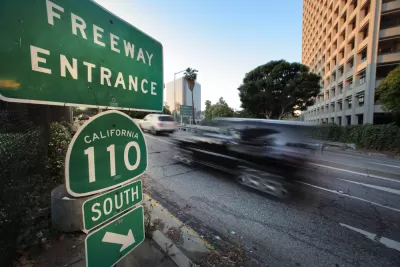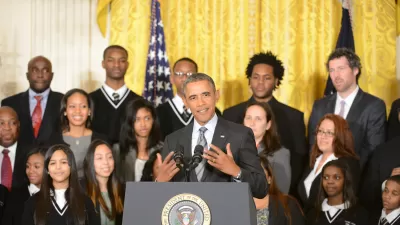South L.A.'s inclusion in the Promise Zones program marks a shift in the way the federal government measures poverty.

The Promise Zone program designates low-income areas with priority for competitive federal grants, as well as support in navigating the relevant agencies.
Nine new zones announced June 6 include neighborhoods in Nashville; Atlanta; San Diego; Florida; Puerto Rico; and, after two unsuccessful applications, South Los Angeles.
Several neighborhoods in Los Angeles were selected for the program when it launched in 2014. But South L.A. wasn’t picked—because despite its high levels of poverty, it didn’t meet federal criteria:
South L.A.’s own brand of poverty, marked by overcrowded housing, underemployment, and high rates of homelessness, apparently wasn’t scoring well when held up against expectations modeled on poverty seen in cities like Detroit (where high vacancy rates and high levels of unemployment are the norm).
Sahra Sulaiman describes in Streetsblog how the South Los Angeles Transit Empowerment Zone (SLATE-Z) collaborative invited HUD Secretary Julian Castro to L.A. "so he could see and hear for himself how the residents defined need"—and convinced the federal government to take varying manifestations of poverty into account.
Through their efforts, SLATE-Z created a network and an action plan that would benefit the community even if it didn't achieve Promise Zone status, Sulaiman notes.
The collaborative's ambitious long-range plan tackles workforce development, transit affordability, investment in local entrepreneurs and infrastructure, education, youth programs, and more.
FULL STORY: South L.A. Celebrates Slate-Z’s Promise Zone Designation; Prepares to Roll up Sleeves and Get to Work

Alabama: Trump Terminates Settlements for Black Communities Harmed By Raw Sewage
Trump deemed the landmark civil rights agreement “illegal DEI and environmental justice policy.”

Study: Maui’s Plan to Convert Vacation Rentals to Long-Term Housing Could Cause Nearly $1 Billion Economic Loss
The plan would reduce visitor accommodation by 25% resulting in 1,900 jobs lost.

Planetizen Federal Action Tracker
A weekly monitor of how Trump’s orders and actions are impacting planners and planning in America.

Wind Energy on the Rise Despite Federal Policy Reversal
The Trump administration is revoking federal support for renewable energy, but demand for new projects continues unabated.

Passengers Flock to Caltrain After Electrification
The new electric trains are running faster and more reliably, leading to strong ridership growth on the Bay Area rail system.

Texas Churches Rally Behind ‘Yes in God’s Back Yard’ Legislation
Religious leaders want the state to reduce zoning regulations to streamline leasing church-owned land to housing developers.
Urban Design for Planners 1: Software Tools
This six-course series explores essential urban design concepts using open source software and equips planners with the tools they need to participate fully in the urban design process.
Planning for Universal Design
Learn the tools for implementing Universal Design in planning regulations.
Caltrans
Smith Gee Studio
Institute for Housing and Urban Development Studies (IHS)
City of Grandview
Harvard GSD Executive Education
Toledo-Lucas County Plan Commissions
Salt Lake City
NYU Wagner Graduate School of Public Service




























